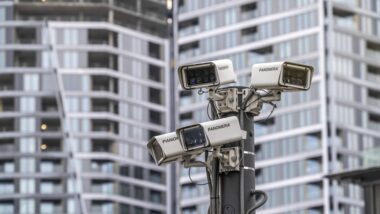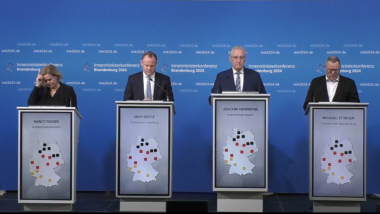Am vorvergangenen Freitag hat der Bundestag mit 129 Stimmen der SPD die Vorratsdatenspeicherung beschlossen. Am Montag darauf zeichneten die Sozialdemokraten die Aktivistin Sarah Harrison mit einem Sonderpreis für besonderen politischen Mut aus.
Wir dokumentieren hier die Preisverleihung an Sarah Harrison und haben mit der Preisträgerin über die SPD, die Vorratsdatenspeicherung und den Paragraphen zur „Datenhehlerei“ gesprochen.
Im Rahmen des Internationalen Willy-Brandt-Preises für die ungarische Philosophin Ágnes Heller ehrte der SPD-Parteivorstand Harrisons Engagement für Wikileaks und Snowden. Ihr Wirken stehe exemplarisch für das Streben nach Transparenz und den Einsatz gegen die ausufernde Überwachung, so die Begründung.
Die Begründung der Jury
Der Vorsitzende der Jury, der Philosoph Julian Nida-Rümelin, hielt vor den Augen von Parteichef Sigmar Gabriel die Laudatio auf Harrison. Nida-Rümelin war Bundesbeauftragter für Kultur und Medien zu Schröder-Zeiten und lehrt heute an der Ludwig-Maximilians-Universität München. Nach vielen Worten des Lobes für den Mut von Snowden, ohne den – so Nida-Rümelin – so vieles wohl weiter im Dunkel geheimer Geschäfts- und Staatsinteressen geblieben wäre, kommt er auch auf die Preisträgerin zu sprechen:
ihrer Rede Parallelen zwischen dem Namensgeber des Preises und ihrer Situation in den Raum:
Like me Willy Brandt worked as a journalist, unable to go home for a number of years. Escaping the Nazis he worked as a journalist in exile before finally returning to Germany and entering politics here.
Heute verbreite ihr Heimatland mit dem Begriff der nationalen Sicherheit Panik und mache den Bürger*innen ihre Rechte streitig. Unter dem Vorwand der nationalen Sicherheit habe Großbritannien eine Untersuchung wegen Terrorismus eingeleitet, die die Rechtssicherheit und ihren persönlichen Schutz als Journalistin gefährde. Dieser Vorwand diene auch dazu, andere wie David Miranda und Julian Assange ihrer journalistischen Rechte zu berauben und den Guardian dazu zu drängen, journalistisches Material zu zerstören. In den Vereinigten Staaten sei dies noch schlimmer:
The surveillance system of the United States is the most abusive and pervasive around the world. They spy not only on their own citizens, but the whole world, including almost every member of the German public, pretty much every member of the SPD, and the German government all the way up to Chancellor Merkel.
Harrison kam auch auf die Forderung nach Asyl für Snowden, auf netzpolitik.org und den Geheimdienst-Untersuchungsausschuss zu sprechen:
The government, including many members of the SPD, have appeared to do all they can to block the possibility for Snowden to testify safely here, protected in Germany. I have followed laws being pushed through, sadly voted for almost unanimously by the SPD, that are a direct blow to the work of WikiLeaks and Snowden, an attempt to illegalise WikiLeaks‘ work for transparency and democracy through the publication of official secrets and still legalize the storing of telecommunication metadata.
Though the inquiry proceeds it is still surrounded by secrecy. It has predominantly been because of Netzpolitik[.org] and WikiLeaks that the German public have had much ability to access documents and many details of this supposedly transparent and democratic oversight process. Despite WikiLeaks’ more recent NSA publications of US selectors to spy on Germans, the BND is still being allowed by the German government to work more for the NSA than their own people by denying the inquiry committee access to their selector list.
Für die SPD sei es in dieser Angelegenheit an der Zeit, Brandts Worte an Kennedy aus dem Jahr 1961 zu wiederholen: „Berlin expects more than words. It expects political action.“
People want political action to protect Assange, political action to protect Snowden, political action to protect Germany from US spying. […] These men should be protected and freed. For the country willing to do so, it will mean having to stand up to the US to defend human rights and the rule of law. I ask that that country be Germany. As Brandt said: „Wir wollen mehr Demokratie wagen“ – let’s dare more democracy.
Die Preisträgerin im Interview
Im Rahmen der Veranstaltung haben wir mit der frischgebackenen Preisträgerin, Sarah Harrison, gesprochen.
Sarah, the SPD awarded you for political courage and your engagement for Wikileaks and Snowden. If you look at the number of 129 votes of the SPD for a data retention law in Germany. How does that go together for you?
As I have mentioned in my speech today: I think it is sad that the government at all, and particularly members of the SPD, are voting for a law that clearly violates human rights.
You live in Berlin, in Germany. Do decisions like the German data retention law change anything with regard to your personal life and safety?
The organisation I work for has had to work for a secure environment for quite a while and for reasons actually unrelated to the mass surveillance. I suppose the impact on my life is not very much, also the change – I mean that is something that many countries are doing, so I am not saying it’s right, but I can not go anywhere where it would be any better which is an even worse situation. Yes, it saddens me greatly but I do see that – I know it’s is not perfect – but in other countries the civil society is having a push back and an understanding of it. I see them to basing these laws in the UK and the public is not even listening.
There is is also a paragraph in the data retention law that penalizes „Datenhehlerei“. Will this have an impact on whistleblowers?
That paragraph is directed against the publishing of classified information as well. I mean that is basically the same sort of thing. What is very sad to see: As these issues are coming up in society and society is debating them, it seems to come to a situation where society is on one side of the issue, and then simultaneously the governments are moving forward in the completely opposite direction. So to me, it is not just a sign of how the governments and the laws are shifting in the wrong direction in and of themselves but also how they seem to be doing less and less for their society and what their own public wants. To me, that is one of the real dangers to democracy, that the governments are just not listening to us.
Beitragsbild: Fabian Warislohner





Die Dankesrede von Sarah Harrison, inclusive Abwatschen der anwesenden SPD Delegation, gibt’s auf Soundcloud:
https://soundcloud.com/spdde/rede-von-sarah-harrison-4-internationaler-willy-brandt-preis
reicht Verfassungsklage gegen VDS ein. Mal schaun, eigentlich kann an einem Gesetz, das zu 80 bis 95 Prozent verfassungswidrig ist nichts geheilt werden. Wäre gut, dann könnte man sich endlich mal über sinnvolle, anlass-/verdachtsbezogene und völlig verfassungskonforme Möglichkeiten mit maximalem Sicherheitsgewinn bei geringstem Eingriff in die Privatsphäre und vorhandenem Rechtsschutz austauschen.
And … thank you Ms. Harrison.
Ein paar Englisch-Fehler:
Wikileak’s -> Wikileaks‘
of this supposedly of this supposedly -> of this supposedly
same source of thing -> same sort of thing
Vielen Dank für die Hinweise, Jim.
Ich habe die entsprechenden Stellen korrigiert.
Ich kann mir die Widersprüche im Handeln der SPD nicht erklären. Am Ende der Rede gab es trotz der verbalen Ohrfeige ordentlich Applaus. Besteht diese Partei neben Umfallern auch aus lauter Masochisten? Oder war die Preisverleihung Anzeichen einer internen Revolution?
Mir kommt da eher pure Ignoranz in den Sinn. Anders kann ich mir das offensichtlich gegen die Interessen des Souveräns gerichtete, verfassungsfeindliche Abstimmungsverhalten dieser Partei nicht erklären.
Was soll diese Ehrung denn auch mit der Abstimmung im Parlament zu tun haben? Dafür müsste man ja zuhören.